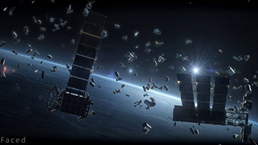By: Serena Li
On June 26, 2024, around noon Eastern Time, a retired Russian satellite, which was circling above the ground at about 220 miles, exploded in space breaking into almost 200 pieces of debris in space forcing International Space Station (I.S.S.) astronauts to take precautionary measures.
Russia’s space agency Roscosmos operated the observation satellite RESURS-P1 Russian Earth that was decommissioned in 2022. It was an Earth observation satellite from Russia that was able to gain high-resolution images, with a resolution up to 1.0 m. It was a replacement of the Resurs-DK 1 satellite until it stopped operating in 2021. In December 2021, the satellite had been decommissioned for failing to board equipment, since its passivation—a chemical treatment for stainless steel to prevent it from damaging—was not performed properly.
Space already has dangerous pieces, but the addition of large debris in space might threaten satellite networks including internet use, communications and even navigation services that are necessary for the earth. These pieces are known as space junk which are remains of non-functional satellites and other human-made objects that orbit around Earth even though their operational lifespan ended.
Following the explosion of RESURS-P1, U.S. officials reported that a NASA crew at the I.S.S. had to temporarily shelter in place at the (I.S.S.) for an hour. The cause of the situation is still unknown. The U.S. Space Command stated that they haven’t observed any threats to the I.S.S. and are continuing to make assessments to keep the space domain safe.
Overall, overflowing space junk has a very harmful impact since debris from one satellite collides into another, which keeps happening. Many space organizations are trying to resolve this issue. The European Space Agency adopted the Zero Debris Charter last year, committing to a global initiative with a goal to reduce space debris substantially by 2030.











